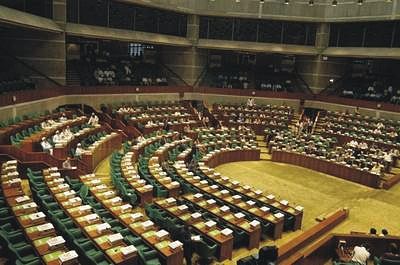Parliament: What art thou?

STAR file photo
A parliament is a sacred entity. By itself, it represents something that is beyond the ordinary. Like the heart in a human body, it is the most important organ of a well functioning democracy.
Bangladesh is a parliamentary democracy where executive power is exercised by both the government and the parliament. In the backdrop of the recent incidents in our parliament, one may be compelled to ask whether we really need a parliament in the first place. Certainly we do, but as the events on February 16 revealed, a major portion of the arguments and debates which took place in the parliament could have been placed on the tea time agenda or an informal gathering!
The walkout on Tuesday was the fifth since the BNP-led alliance returned to the House on February 11, breaking their 10-month boycott of parliamentary proceedings. They had previously walked out of the House protesting derogatory remarks by the treasury bench members against slain president Ziaur Rahman.
The lawmakers belonging to Bangladesh Nationalist Party (BNP) walked out from the House, not once but twice, on February 16. The first walkout was, according to Moudud Ahmed, a response to the government's "meanness." According to him, the government's decision to change the name of the international airport, given after Ziaur Rahman nearly three decades ago, reflected the government's determination to marginalise the BNP from mainstream politics. The BNP staged a second walkout on the same day when the ruling party's lawmaker, Zillul Hakim, termed Tarqiue Rahman a "great thief and champion of corruption."
Such incidents in the parliament truly bemuse the mind of a political analyst! After all, is parliament not an entity where legislative activities are supposed to take place? In plain words, laws, bills and issues of contemporary concern are debated in the parliament, whereby conflict of interests, particularly in the area of policymaking, is reduced and the scope to reach a mutually acceptable decision or solution is enhanced.
However, Bangladesh's parliament is special in the sense that "fusion of powers" is omnipresent in all branches of the government. This is because most of the ministers of the executive branch are drawn from the legislature, such that they are intertwined, whereby the head of the government becomes de facto the chief executive and chief legislator.
The parliamentary system in Bangladesh does not have a precise separation of powers and operates as a unicameral legislative body, leading to a different set of checks and balances. This causes a fusion of powers, which, in turn, paralyses the functioning of the parliament. Separation of powers, with regard to the judicial and executive branches of the state, was implemented on November 1, 2007 by the caretaker government, though to what extent this has helped the judiciary become impartial and independent is a matter of debate.
A parliament's overarching goal is to provide a check and balance mechanism, restraining individuals or groups from gaining absolute power and thereby protecting dissenting individuals and minority groups from the "tyranny of the majority."
In Tuesday's session, the speaker of the House, Abdul Hamid, urged leaders not to use any words that went against parliamentary values. However, there is no code of conduct governing the usage of words and functional aspects of the parliament. Reiterating Zafar Sobhan's words, "enough, surely, is enough."
Elected leaders, if they cannot focus on improving the state of the country, should at least avoid indulging themselves in debates that do not do anything for country's common citizens. Indeed, Bangladeshis gifted Sheikh Hasina a landslide victory hoping for a better future. Nevertheless, if renaming establishments and constantly revisiting the past by "correcting" the opposition are the only instruments available to the government, who knows where that might lead?
Most importantly, if the past cannot be detached from the present, how will the future discourse be shaped? It is time to let the past be, and let the departed souls, particularly of Bangabandhu and Ziaur Rahman, rest in peace.

 For all latest news, follow The Daily Star's Google News channel.
For all latest news, follow The Daily Star's Google News channel. 



Comments